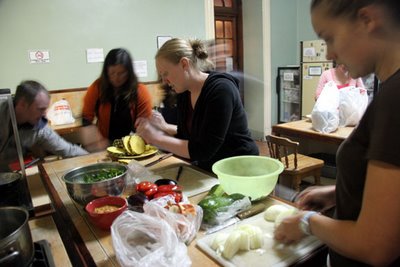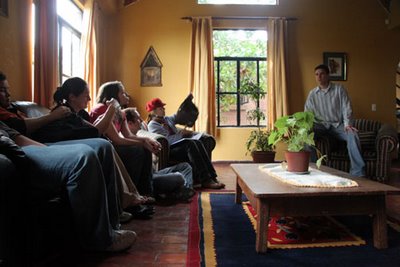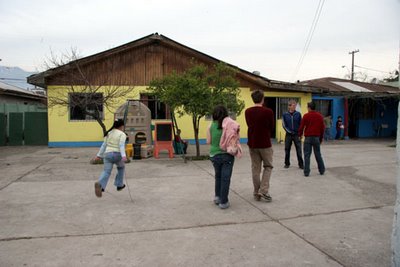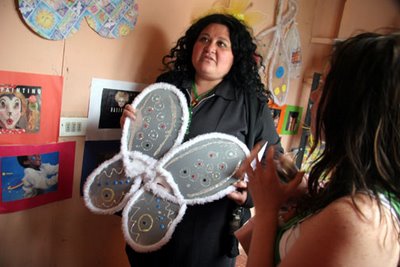
Orientation week is now in full swing. This past Sunday all volunteers had finally arrived at La Casa Roja, the backpackers hostel in which we are living for the week. After making a trip to the local grocery store, we tested our teamwork in preparing dinner for all of us in the huge communal kitchen here. While I have eaten in some cafés and restaurants here, I have only tried a few dishes. Already I can tell that I will be eating more avocado, or "palta," than I probably have in my whole life up until this point. But I'm ok with that, since you can find variety in the items on which you put the palta: here, palta can even go on pizza. We decided to stick with pasta, since there is a whole aisle of it here in the grocery store, but if you are particular about your pasta sauce you may find the tomato to sugar ratio in the Chilean version of pasta sauce rather staggering.
The way that VE is structured, a new "class" of volunteers arrives every three months. Participants may leave after the first three months, or they can stay for as long as they would like thereafter. Most people stay between 3-12 months, depending on what they have time for and what they can afford. The first week you are in Santiago is thus your orientation week which is hosted by the any current volunteers and is a collage of meetings, presentations, games, tours, talks and meals. Monday morning we began this very full, intense week. I have a feeling that my days here might quite possibly be full and intense for the entire duration of the trip. As of halfway through this orientation, we have visited 2 hogars, or homes, shared small group and large group meals, participated in many games including a scavenger hunt around Santiago, met with the directors of the centers in which we will be working, and engaged in many stimulating discussions about what we are trying to do here.

Here we are at the Casa Grande, or Hogar Esperanza, with Luke about to present Jorge Daveggio. Jorge is the director of this hogar, and the instigator of the foundation. We gathered in the living room and he told us the story of why he founded this place when he was only 19. He had a job when he was 18 where he was around kids his own age and younger, and he would see them pick through the garbage to look for food. But everyday after work, he would go home to his family and food would be ready for him on the table. The injustice struck him so deeply that he and two friends founded this private home with the mission being to raise the children there as if they were their own. 25 years later, Jorge is still playing father to the kids at Hogar Esperanza, or Shelter of Hope. He imparted realistic and sincere advice, encouraging us to be positive, proactive, humble, and determined. I feel very comfortable knowing that he has made himself available at any time to any one for questions or discussions-- there is much to learn from him.


During orientation week, we are divided into small groups of new volunteers led by one current volunteer. Throughout the week the small groups visit other hogars or centers so that we have a better understanding of the scope of VE, as the network of organizations with which it works is very wide in range. My group's first visit was to Club Domingo Savio, a community center that has existed in some capacity for over 20 years. While Domingo Savio used to be a live-in home, now it is called a "Club" and acts as more of a preventative force in the at-risk community in which it is found. D.Savio is funded completely privately, and even though it's resources are still very limited, the positive energy in its classrooms and playground fights hard against the hard reality of the children who work and play there. The volunteers assist and support the strong permanent staff of the Club, and they are the only ones who actually sleep in the modest building. Many of the children who are a part of D.Savio have single mothers who work incredibly long hours, and so after a half day of school (a normal school day for most) the kids would have nowhere to go. Club D.Savio provides them with personal attention with their homework, basic lessons about right and wrong, health and hygiene, proper behavior and the like, exposure to music and theatre, and a hopeful view of the future. What's more, every Tuesday parents are invited in to cook in the kitchen and to see what their children have been doing. Club D.Savio costs no money to families save 1.000 pesos per month for toilet paper-- the equivalent of about $2.00. If somebody cannot pay, they can simply donate one day a month of their time to help clean the Club.
Today we had the privilege of meeting with Steve Reifenburg in Harvard's office in Las Condes, a very affluent neighborhood in Santiago. Over 20 years ago he too volunteered at Santo Domingo Savio; he now focuses on international conflict resolution. Another genuine and strong leader, Steve discussed with us a wider view of Chile's socio-economic position and the role of poverty in its history. We weighed its successes against its challenges, from female presidents to a new highway that excludes citizens with its incredibly high tolls. With the education system being one of its most frustrating obstacles to date, Steve asked us stay mindful of our roles as sort of teachers in one way or another.
I am anxious to see the Aldea Maria Reina, where I will be working. I have heard from other groups what it is like, and I have met the director, but a clear understanding of what I will bring to the institution is not to be had until I go. I will admit I am nervous. But even half way through orientation, I feel that I have a strong network of supporters and access to valuable advisors. Until this weekend then, cheers.



No comments:
Post a Comment